“It is our job to represent the interests of the millions of people whose sight is potentially at risk”
Leaders from three charities talk to OT about their work on The Eyes Have It partnership, and how the group is pushing for systematic change in eye health

12 January 2024
The Eyes Have It is a partnership of Macular Society, Fight for Sight/Vision Foundation, RNIB, Association of Optometrists, The Royal College of Ophthalmologists, and Roche. Roche has funded the activities of the partnership.
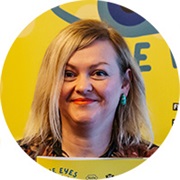
Vivienne Francis
Occupation:Chief social change officer at Royal National Institute of Blind People
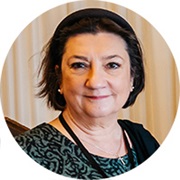
Cathy Yelf
Occupation:Chief executive of the Macular Society
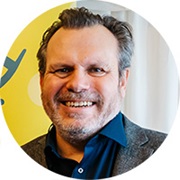
Keith Valentine
Occupation:Chief executive of Fight for Sight/Vision Foundation.
What are the key challenges being faced by the people that you support at the moment?
Vivienne Francis (VF): The challenges are multi and varied. But one of the reasons we’re all here today, calling for a plan for eye health, is the delays in the system.
We know that there are more than 600,000 people awaiting specialist treatment for eye health, and that 20,000 of them have been waiting for more than a year. And yet, some of these people will be requiring specialist treatment that needs to happen on a monthly, not an annual, basis.
One of the core elements of inequality and injustice that we want to address is people unnecessarily losing their sight because of delays in the system. That’s why we have recently collaborated as a sector on the Eye Health Support Pathway.
Cathy Yelf (CY): It is the delays, and not being able to get access to treatment or rehabilitation services in the right way.
The nature of sight loss has changed remarkably over the past 20 years, and the process for managing eye care hasn’t changed to keep pace with the enormous demands that there are now on the service.
There needs to be a system redesign, to make sure there is enough capacity in the system to treat the people who need to be treated, and that’s a big job. It needs leadership and a plan around it, so that it’s done in the most efficient way for the NHS and for patients. It needs an overarching picture of how we are going to redesign the services efficiently, so that they can cope with the demand that is on them.
One of the core elements of inequality and injustice that we want to address is people unnecessarily losing their sight because of delays in the system
Keith, you have a different remit, because Fight for Sight/Vision Foundation funds research. Do you have anything to add?
Keith Valentine (KV): Research is a critical part of the treatments of the future. You can see the benefits of that in the system now, particularly around cataracts, glaucoma treatment, and the work Cathy and the team have done around macular disease.There are a lot of reasons for hope and optimism in the potential for scientific research to take us forward. But there is a lag between the level of investment that is there for research, and the experience of people, after a diagnosis and as they live with a condition, who may be somewhat divorced from the eye health system.
If you lose a leg, the consultant surgeon can refer you to somewhere where they can rehabilitate you so you’re able to walk again, and access prosthetics, and continue to work. No such thing exists, at the moment, for people who are experiencing sight loss.
There have been great strides over the years, with things like eye care liaison officers from the Royal National Institute of Blind People (RNIB), and current work between the voluntary sector and NHS England to try and look at fixing the issue. But the common sense point, that I think everyone would agree on, is that no one should experience sight loss without there being planned support in place. There should be no diagnosis without support.
That’s pertinent for us in terms of research, because the efficiency of the system – the connection between optometry and ophthalmology, the connection for patients beyond diagnosis for certain conditions – is critical for the research community to be able to conduct studies and to engage with patients in trials.
At the moment, our view is that the UK underperforms in that environment around ophthalmology, which is startling when you look at the expertise that we have and the potential there is within patient organisations, such as Guide Dogs and RNIB, to reach out to their populations.
No one should experience sight loss without there being planned support in place. There should be no diagnosis without support
Could you tell OT about your roles within The Eyes Have It, and the work you are doing to represent your organisations as part of the partnership?
VF: Our role is particularly around the Eye Care Support Pathway and making sure that gets embedded – that there is an end-to-end system for people, from the moment they realise something is not quite right, through to diagnosis and into vision rehab.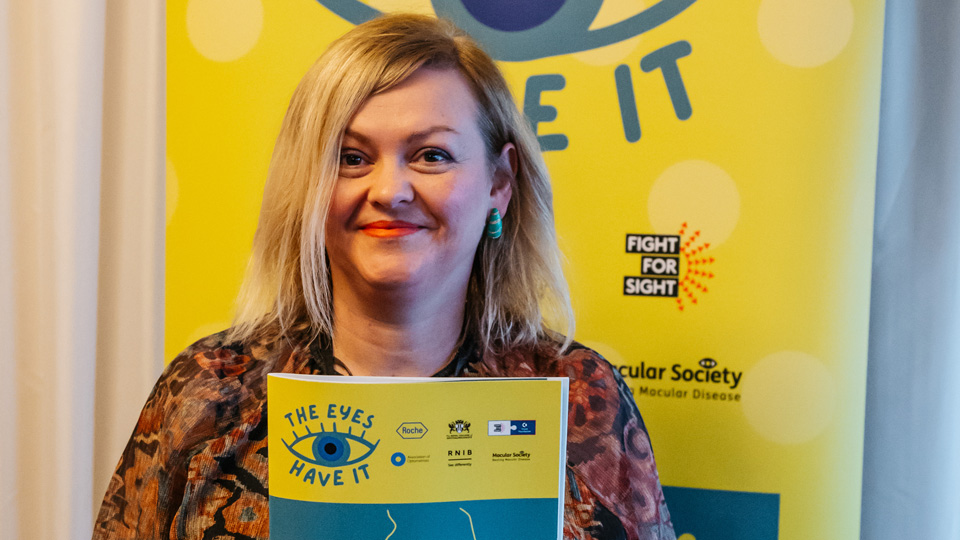
That will be an increasing focus for us, to really build that independent living piece beyond the system itself. That’s linked with the work we’ve done recently to launch the pathway. That’s our key focus in the partnership.
CY: We have benefited from the partnership in that we have been able to get traction on some issues that I don’t think we would have as individual organisations, or as the Macular Society alone.
Macular disease is responsible for as much registered sight loss as every other form of sight loss combined. It is by far the biggest cause of sight loss in the UK and in the developed world. There could be as many as eight million people with early-stage age-related macular degeneration in this country, aside from those who are already affected.
It is a huge public health issue, and it is our job to represent the interests of the millions of people whose sight is potentially at risk as a result. It is our job to do our best for the members of the macular community.
KV: I think I’ve got two hats. The first is making sure the development of new treatments, alongside those that already exist, isn’t lost in the system, and thinking about the way that the system is organised. The potential of eye research is greater than I think it has ever been before, and it is critical that connections are made in that environment as we plan.
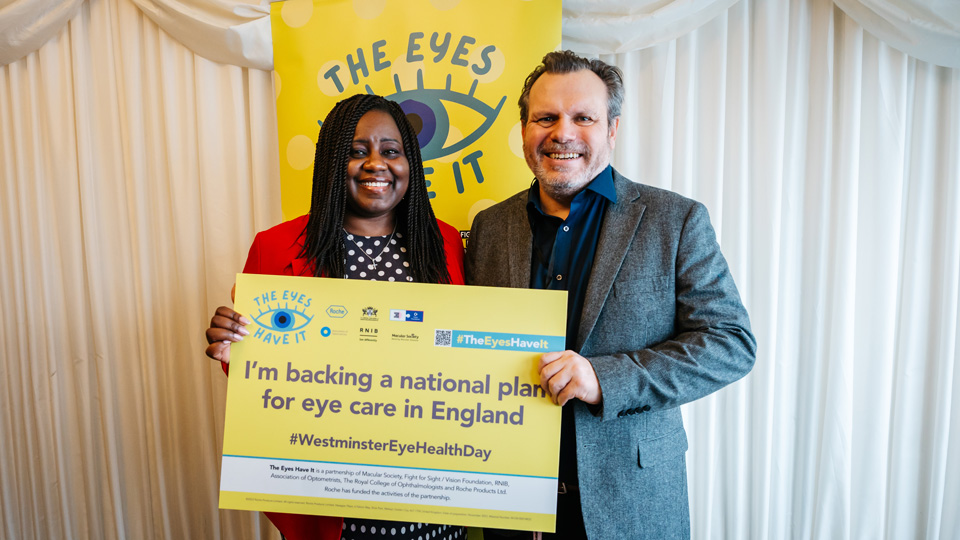
My other hat is as someone who is from a family where every generation has gone blind, including my daughter. I am the only leader of a national sight loss charity who is visually impaired themselves, and I take a huge responsibility in that. Admittedly, it boils over sometimes, and I get quite emotional about it.
Something in this partnership that I think I have been able to contribute to is thinking about the system being shaped for the individual patient. That, in my mind, is about that moment when someone gets a diagnosis. The first thing that someone thinks is, ‘can you stop it happening to me or my child?’ Then they think, ‘how am I going to live my life?’ Those two questions are, I think, inseparable.
The opportunity to have a seat at the table, to be there talking about that and it being understood in the context of the wider system improvement that we all want, is critical. It’s about the willingness of colleagues, such as Vivienne and Cathy and many others, to get something done that, at its root, is common sense.
CY: The Macular Society also funds research. The NHS is a resource that no other country in the world has, in terms of research infrastructure: access to patients, for example, and a national system.
Designing research within a national eye care plan is really important to make the most of the resource and advantage that we have. We don’t have an advantage in terms of the amount of money being put in, but we do have advantages in the NHS system. So, build that into a national plan and make it central.
The Government wants people to be involved in research. It’s part of the big life sciences picture: making the UK a powerhouse of the life sciences and of medical research. Now is the time to do it for ophthalmology, because these problems will not go away. We don’t want to have four million blind people in 20 years’ time. We don’t want to have more blind people that we’ve ever had in the history of humanity. We need to fix this. That means focusing on the research and building it into a national plan.
We don’t want to have more blind people that we’ve ever had in the history of humanity. We need to fix this. That means focusing on the research
What do you hope happens in 2024, and what key benefits do you think The Eyes Have It will bring?
CY: The key thing that we’ve got to do is turn this report [the Laying the foundations for the future of eye health in England report, launched at Westminster Eye Health Day] into action. This is what we think needs to happen, and we need to get momentum behind it [the recommendations of the report] actually happening. It is going to be a difficult year, with a general election in the offing. But that is both a challenge and an opportunity.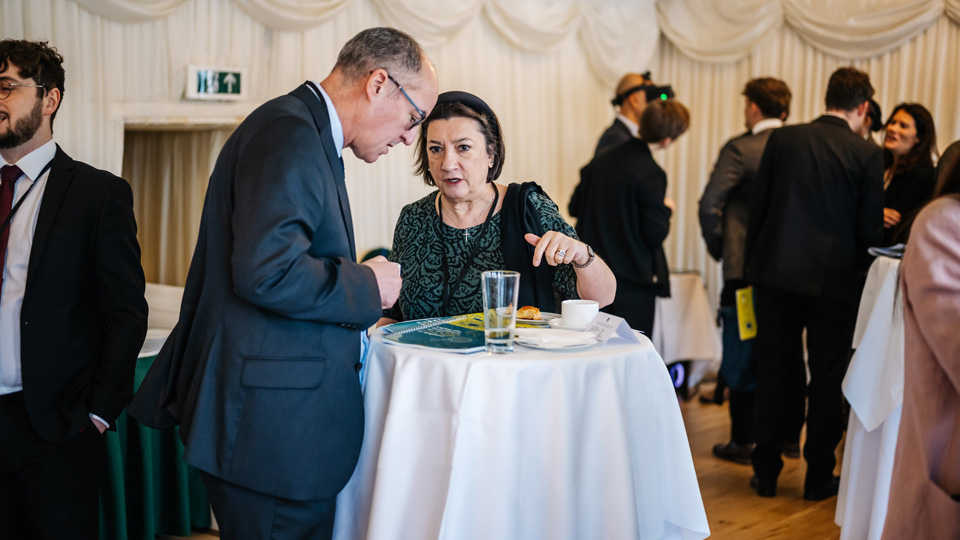
VF: We’ve got buy-in to the Eye Care Support Pathway, and we’re now calling for this broader plan. We want to see action, so delays start to come down.
We are particularly keen to start seeing more buy-in to the eye care liaison officers, so there is more tangible support for people. We have seen in other areas where there is a strategy, like dementia, things really do push forward. We need to make sure the plan gets turned into action.
KV: As Vivienne and Cathy said, it’s about getting something done, and starting to convert the planning and the partnership into something that gets traction.
It is going to be complex to do that in an election year. But I feel optimistic, if we keep coordinated and focus policymakers across the house on talking about what the potential is of what we’re proposing. We are proposing something that is efficient in terms of reaching patient outcomes and in supporting the population. It is also efficient in terms of the productivity of the country: keeping people in work when they’re impacted by conditions that affect sight. I’d like to see progress.
If you had the ear of the new Minister for Primary Care, Andrea Leadsom, what would you say?
KV: That there are too many people being impacted by conditions that lead to sight loss, and that when they move to get support, it is inadequate. So, work with us, a willing system and willing partnerships, to get a change in place and help us to make sure that where there are treatments, there will be no diagnosis without support.
CY: I would say that primary eye care cannot be seen in isolation. It has to be part of an ecosystem of eye care. One thing I’d like her to do is look at how that ecosystem can be joined up and operate properly, rather than in professional silos. It is happening, and COVID-19 helped a little bit with some of this. But it needs accelerating, because the need is urgent.
VF: We were delighted that Andrea endorsed the Eye Care Support Pathway. It’s a great first step, but we really want to see a tangible plan. It will be about emphasising the ripple effect: that people getting the right diagnosis and the right support leads to independent living, which leads to people working for longer. It’s that broad, holistic impact on people’s lives, and their ability to contribute to society without barriers. It’s all interconnected. We want to be talking about that.
Lead image: The Eyes Have It members, Cathy Yelf and Keith Valentine, are pictured alongside fellow members of the partnership and other stakeholders, including AOP policy director Carolyn Ruston and chief executive Adam Sampson, at Westminster Eye Health Day 2023


Comments (0)
You must be logged in to join the discussion. Log in